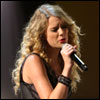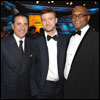CBS Par can't escape 'Fugitive' burn
Music of Classic TV series removed for DVD
|
|
This month's DVD release of the second season of David Janssen's 1960s skein "The Fugitive" caused a firestorm when fans of the show and many in the music industry discovered that the entire underscore had been replaced -- not just a song here or there (not uncommon in shows where music licensing is a factor) but all of the dramatic music. Only composer Pete Rugolo's title theme remained, and only under the main and end credits.
DVD releases of song-heavy shows like "WKRP in Cincinnati" and "Northern Exposure" saw the replacement of many tunes, but the "Fugitive" case appears to be the first instance of so-called background music being dumped wholesale.
Homevid execs regularly face music-licensing issues because, until 10-15 years ago, TV music deals rarely included language that covered future releases in new media. (Now contracts state the usage is for "any and all media now known or hereinafter devised.")
Relicensing songs can cost $10,000-$40,000 each and sometimes much more. The numbers vary depending on prominence, use in the show and the language of the original contract. The Motown songs in season one of "Murphy Brown" reportedly cost nearly $1 million, while "The Wonder Years" has long been rumored as a DVD nonstarter because of the high-profile 1960s rock that was a staple of the series.
The first season of "The Fugitive" was released on DVD with nearly all its music intact.In most cases, there's not a problem with clearing the show's underscore, because most composers create TV music as a "work made for hire," and the production owns it outright.
But "The Fugitive" was not scored like most shows. Music editor Ken Wilhoit drew not only on Rugolo's library of "Fugitive"-specific music but on other libraries, primarily the CBS Music Library.
Just hours after the $40 "Fugitive" package hit the streets, angry fans began venting on Internet message boards. The popular Home Theater Forum website received hundreds of posts, using words like "fiasco" and "sickening," while the customer-review section at Amazon.com was rife with upset buyers decrying the "DVD defamation of the year."
On June 17, CBS Home Entertainment issued a statement saying, "Unlike season one, there were a large number of cues, the current ownership of which was not clear. ... We kept the original theme song but decided it would be better to rescore full episodes to give viewers a seamless, consistent experience throughout."
Sources suggested that the occasional use of music from the now-defunct Capitol Music Library was problematic and that confusion existed about which music was Capitol's and which belonged to CBS. Rather than guess, they replaced it all, including Rugolo's music, which often opened and closed acts and helped give the Quinn Martin-produced series musical consistency.
CBS Par execs refused to answer specific questions about the decision.
"It's a guessing game," said music attorney Steve Winogradsky, who is often called on to clear songs for old TV shows.
"Presumably, studios do research to determine (what) there's a market for," he continued. "That helps determine what the offer is for video rights (to the music)."
Fans are livid because the music of any classic series is familiar, and new music can be jarring even if written in a similar style.
Gord Lacey, editor of TVShowsonDVD.com, said he thinks CBS Par erred by failing to warn consumers, adding only a tiny disclaimer on the package ("some music may have been changed"). "If you're trying to sneak these releases out hoping nobody's going to notice you replaced all the music, it's not going to work," he said.
Lacey thinks such studio tinkering and failure to be upfront about altering classic product "is training the consumer not to buy." Worse, he worries that the result will be a boon to the ever-present market for bootleg DVDs. "A lot of these studio releases are pushing more people into buying pirated material," he said.










